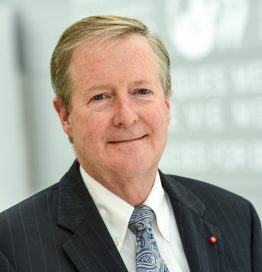On May 10, 2023, KEI held a special hybrid rollout event for the inaugural volume of its new flagship journal, Korea Policy. Event description below: “Like our previous publications, Korea Policy…
Our Team

Email Randall S. Jones
About Randall S. Jones
Dr. Randall Jones is a non-resident distinguished fellow at the Korea Economic Institute and a Professional Fellow at Columbia University’s Center on Japanese Economy and Business. Previously, he served as the Senior Counsellor for East Asia and as Head of the Japan/Korea Desk at the Organization for Economic Cooperation and Development (OECD) in Paris from 2002 until August 2019. During his 30 years at the OECD, Dr. Jones wrote all 16 OECD Economic Surveys of Korea and 15 OECD Economic Surveys of Japan, in addition to a number of other publications. In recognition for his work on Japan and Korea, Dr. Jones received the Decoration of the Order of the Rising Sun from the Government of Japan and the Sungnye Medal of the Order of Diplomatic Service Merit from the Government of Korea in 2018. Before joining the OECD in 1989, he spent three years in the U.S. government, serving at the Council of Economic Advisers and as an advisor in the State Department. Dr. Jones was also the vice-president of the Japan Economic Institute in Washington. Dr. Jones received a B.A. in Economics from Brigham Young University and a PhD in Economics from the University of Michigan in 1984. He lived in Korea from 1974 to 1976.
May 18, 2023
New South Korean President Lee Jae-myung takes office at a time of serious economic challenges in South Korea. Real GDP fell by 0.2 percent in the first quarter of 2025, with private consumption, fixed investment and exports all reporting declines. The political crisis triggered by Yoon Suk Yeol and his martial law declaration late last…
July 1, 2025
President Donald Trump said on February 18 that he intended to raise automobile tariffs on all U.S. automobile imports. He followed through with this plan on March 26, announcing a 25 percent automobile tariff that took effect on April 2, making engines, transmissions, powertrain parts, and electrical components, as well as fully assembled cars, all…
April 29, 2025
South Korea’s Nationally Determined Contribution (NDC) under the Paris Agreement sets a target of reducing its greenhouse gas (GHG) emissions by 40 percent by 2030 (relative to their peak in 2018). Korea also aims to achieve carbon neutrality by 2050 (Figure 1, Panel A). The targets are ambitious, as Korea was the world’s thirteenth-largest GHG…
February 27, 2025
South Korean President Yoon Suk Yeol’s short-lived declaration of martial law on December 3, 2024, and his subsequent impeachment on December 14 have plunged the country into its worst political crisis in nearly 40 years, with some signs of a negative economic impact. The economy was already showing signs of weakness before the December political…
January 29, 2025
Korea is pursuing a bold strategy in an effort to achieve a paradigm shift that results in a fair economy. Some of its major initiatives – notably sharp increases in…
July 30, 2019
The tax burden in Korea—at 26 percent of gross domestic product (GDP) —was well below the average of the member countries of the Organization for Economic Cooperation and Development (OECD)…
May 25, 2011
Korea is in the midst of the most rapid demographic transition of any member country of the Organization for Economic Cooperation and Development (OECD); the share of Korea’s population older…
May 25, 2011
September 23, 2022
The conversation will be livestreamed on YouTube.
